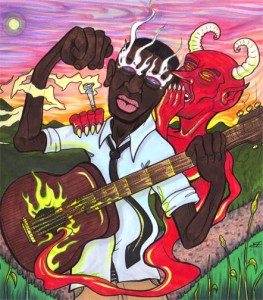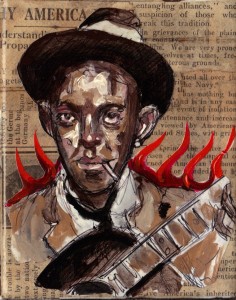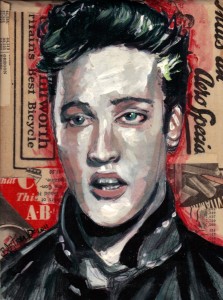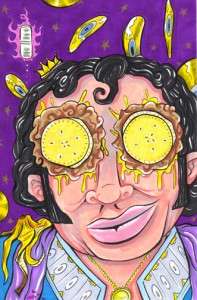The Devil and Robert Johnson
Even after the abolition of slavery, life in the Mississippi cotton fields was brief, brutal, and as boring as an aging preacher’s Sunday sermon. No wonder fieldworkers sought the fleeting comforts of cheap moonshine and loose women at the Saturday night juke joints.
Robert Johnson could mix it up with the best of them, but he was never one for hard work. His bizarre, spider-like fingers weren’t intended for cotton-pickin’ and penny-pinchin’. They were made for crawling across guitar necks, whiskey bottles, and the legs of middle-aged sugar mamas. If Johnson was going to suffer hell to make a dollar, it would be as a wayfaring musician. His road was full of adventure and ecstasy, but ended in hell just the same. On August 16, 1938, Robert Johnson became another silent corpse wrapped in the shrouds of rock n’ roll mythology.
As legend has it, Robert Johnson obtained his profoundly influential guitar licks after trading his soul to the Devil at a dark, isolated crossroads. As usual, Ol’ Scratch came through with the goods, but America was still dragging itself out of the Great Depression and debt-collectors were ruthless. Why should Satan be any different? Johnson had enough time to make his name as a blazing live musician and to record forty-two immortal tracks before Satan came to collect the player’s soul at the prime age of 27.
Like the crossroads myth, Robert Johnson’s handful of recordings would not surface until many years after his death. Also like the myth, these forty-two recordings have been open to interpretation and elaboration ever since. His slick slide guitar style was first taken up by black blues players. Son House, Muddy Waters, and John Lee Hooker were among the many to follow those smoking hoofprints to notoriety. Ultimately, it was only when Robert Johnson’s work was unearthed and re-released during the Delta blues revival of the 1960s that the man and the myth came into their own. White rock stars—Eric Clapton, Keith Richards, Stevie Ray Vaughn, Paul McCartney—rode Johnson’s Afro juju to the top of international charts, where the fires he unleashed burned the soul of Western civilization.
As a journeyman guitarist, Robert Johnson was the laughing stock of his juke joint peers. His unorthodox style sounded like a stray cat shaken violently in a metal trashcan. After a brief hiatus, Johnson returned to the scene with a totally unique style in which he would hammer a rhythm with his thumb while picking a slide melody with his fingers. Johnson’s recordings may sound like the goofy meanderings of a slap-happy simpleton to the average listener, but in those days he was the bee’s knees. No one had done anything like that before.
An offhand and perhaps jealous remark by Son House was the start of the crossroads myth, when he said that Johnson had “sold his soul to the Devil in exchange for learning to play like that.” The location of this diabolical deal came from Tommy Johnson via his brother:
“If you want to learn how to play anything…and learn how to make songs yourself, you take your guitar and you go to…where a crossroads is…. Be sure to get there just a little ‘fore 12 that night…. A big black man will walk up there and take your guitar, and he’ll tune it. And then he’ll play a piece and hand it back to you. That’s the way I learned to play anything I want.”
Just as an enterprising black man of large stature might make a few bucks by hanging around a crossroads to dupe superstitious guitar students, so the media myth-making machine was able to turn a profit by misattributing Tommy Johnson’s statement to Robert Johnson. The rest is sketchy history, but as with many myths, Johnson’s crossroads story remains poignant.
By all accounts, Robert Johnson was a diehard rake. His first wife was a girl in her early teens who died while giving birth to a stillborn child. After that tragedy, Johnson would not be tied down. He wandered from town to town, seducing local women for bed, booty, and breakfast. This song and dance took him from the reeds of Memphis to the towers of Chicago. Hopping trains with crisp suit and a guitar under his arm, Johnson knew how to get around cheap and still sleep in a warm bed. His usual prey were plain, aging bar-hoppers who could not resist his sharp dress and blistering guitar licks. Johnson was one of a special breed that sings while playing rhythms and melodies simultaneously—who knows what sort of sexual percussions he could hammer out in the bedroom.
The only thing he loved more than pulling another man’s woman was a stout glass of whiskey. Amped up on booze and ego, he frequently found himself in bar room brawls, usually over another man’s woman. He was just as quick to take on a gang as he was to fight one-on-one. Unfortunately, he was a skinny blues player in dapper attire, not a street tough, which meant that he took a lot of ass-whippings for his efforts—as did many of his friends who stood up to defend him. Apparently, victory in battle was not part of his deal with Ol’ Scratch.
Johnson’s solid reputation as a smoking live guitar player led him into the hands of ARC producer Don Law, who recorded Johnson’s first sessions in San Antonio, TX in 1936. The results were thrilling, and Johnson was as proud as a purple puppy. One night, as Don Law ate in a restaurant with his wife, he received a phone call from jail. Robert had been arrested for vagrancy and needed bail. Law made arrangements for the player’s release, and an hour later received a second call. Johnson had immediately found himself a hooker, but there was a problem. “She wants fifty cents and I lacks a nickel.” Rock n’ roll excess has come a long way since the Depression era.
Johnson left Texas with a hundred bucks in his pocket and his earthly immortality encased in acetate. After wandering the highways for a spell, he returned to Dallas in 1938 to record a few more sessions with Don Law. It was then that he laid down his nefarious tracks “Hell Hound On My Trail” and “Me and the Devil Blues.” They are both about the troubles of hopping from town to town milking old maids for muff and money, but the second is more direct—an infernal, if playful ode to the burning core of all phallocentric rock n’ roll shenanigans:
Early this morning
when you knocked upon my door…
And I said “Hello, Satan. I believe it’s time to go.”
Me and the Devil
walking side by side…
I’m going beat my woman until I get satisfied
She said you don’t see why
that I be dog her ’round
(Now baby, you know you ain’t doin’ me right…)
It must be that old Evil Spirit so deep down in the ground
You may bury my body
down by the highway side…
So my old evil spirit can catch a Greyhound bus and ride
Robert Johnson was found dead in a Mississippi plantation house at the age of 27. He officially opened the doors of the 27 Club to all later members: Brian Jones, Jimi Hendrix, Janis Joplin, Jim Morrison, Pete Ham, Kurt Cobain, and most recently, Amy Winehouse. Rumors abound about the cause of Johnson’s death—everything from bad moonshine to poisoning by a jealous lover to syphilis—but one thing seems certain: he chased excess to its logical conclusion.
I have no doubt that Robert Johnson was among the multitude of artists who met Ol’ Scratch at the crossroads of the human soul. If the kingdom of God—on His better days, anyway—is benevolence, mercy, chastity, discipline, and unwavering faith, then the domain of the Devil must be the vast expanse of human potentialities between these virtues and the Void.
The fires of Hell burn in humankind’s lust, greed, gluttony, and wrath. The flames come on warm, like sweet liquor on a dry tongue, and everyone gets a little taste. Most turn back there, but plenty more linger until they are scorched into a disfigured husk of what was once human. You could say that Robert Johnson opened wide the gates of Hell for every rock star martyr to come.
Enter Elvis Presley.
Elvis Presley: The King of Dead Rock Stars
Elvis Aron Presley was born in Tupelo, Mississippi in 1935—just an hour as the crow flies from where Robert Johnson would die a few years later. Elvis’ twin, Jesse Garon, was a stillborn herald to the King of Rock n’ Roll. Elvis would later claim that he took his dead brother’s power at the moment of his own birth, making Elvis a god.
The surviving Presley twin spent his earliest years in a shotgun shack—like ‘at genu-wine white trash. When Elvis was still a boy, the Presleys moved into Memphis’ Lauderdale Courts housing projects. His over-protective mother, Gladys, would walk him to school every day. She frequently took young Elvis to church and feverish Pentecostal revivals, where he would get his first taste of true showmanship. But this doting couldn’t stop the boy from finding his way to Beale Street.
Memphis night life exposed Elvis to every sin under the sun, if not in the flesh then at least in song. Presley grew up with gospel and loved country, but he was head-over-heels in love with the dark and dirty blues. Years later, his records would be shunned by white stations for being too bluesy and passed over by black stations for being too country. Such racial quibbling wouldn’t be enough to stop Presley, though. He was destined to become the King of Rock n’ Roll.
Still a fresh-faced teenager in 1953, Elvis walked into Sun Studios where he cut his first singles to bring home to his mother. Some time before, producer Sam Phillips had quipped, “If I could find a white man who had the Negro sound and the Negro feel, I could make a billion dollars.” Phillips heard the Call of Cthulhu in Elvis’ early attempts and immediately brought the boy into the Sun Records fold. Within three years, Elvis Presley was the most famous motherfucker in the world at age twenty-one.
Many fans agree that Elvis’ early years were his most inspired. The rockabilly swagger of “Hound Dog,” “Jailhouse Rock,” and “Heartbreak Hotel” had the nation swinging its hips in imitation of their lascivious leather-clad icon. Who knows how many pregnancies this lip-curling Dionysus inspired? Elvis was derided by pious commentators as an uncouth cuckoo, but the former carnival huckster “Colonel” Tom Parker knew exactly what that meant. Elvis was the goose who shot golden sperm, and Colonel Parker wasted no time taking the loony bird under his wing and managing his brilliant, if debaucherous career.
Then in 1958, Presley was called to serve his country. He got a clean cut hairdo, a uniform, and a rifle. Within a few months, he was on a plane to be stationed in Germany. For snooty connoisseurs—including John Lennon—Elvis’ enlistment marked the end of his meaningful contributions to rock n’ roll, but without a doubt, it was a fine stepping stone for a budding pussyhound.
Presley was known to fool around with the wild black girls of Beale Street and various squealing groupies in his youth, but Europe would take him to depths unknown. The photos of Elvis published in Private Elvis after his death show the young soldier between the folds of Moulin Rouge mammaries and under the tongues of various spooky-toothed Euro whores. Hey, man, be all that you can be, right?
As it happened, it was during his time in Germany that the twenty-three year-old singer met the pubescent American girl Priscilla Beaulieu, who at fourteen was offered up to the rising star by her mother as a sort of child bride. Dog will hunt! From then on, Priscilla would fool around with Elvis—even play “dress-up video sex games” with him—but they never had sex until the time of their wedding ten years later, when Priscilla became pregnant. According to her next lover, Elvis’ karate coach Mike Stone, the celebrity spouses never had sex again.
After the excesses of the 60s had desensitized the nation, Elvis’ gyrating pelvis seemed pretty innocent in comparison. He wasn’t there to burn wombs with great balls of fire—he was there to love you tender. At the dawning of the Age of Aquarius, Elvis was widely regarded as the universal sex symbol for Miss Norma McNormalson. Not the brightest eyes, but man, you could break a cinder block over his square jaw.
For the duration of his god-like superstardom, Elvis’ PR team labored to portray him as a sweet lil’ mama’s boy with an angel’s voice and a heart of gold—even when he wore mutton chops and gaudy rhinestones during his final, bloated Vegas years. No doubt this was true to some extent. He did move his parents into Graceland where they lived out the rest of their lives in comfort and splendor. He was known to write checks for many poor souls who needed his help—sometimes for four or five figures. “Nnnnnnew Cadillac!” I mean, goddamn, how many pictures did he take with feeble old ladies and snot-faced little kids? On his best days, the man was practically a saint!
Then there were his other days. For all of his spin as a good ol’ boy from tha holler, Elvis certainly had peculiar tastes behind closed doors, and I’m not talking about peanut butter and banana sandwiches. Albert Goldman’s Elvis is a tabloidesque lost gospel that peels the rhinestones off of Presley’s shades and replaces them with all kinds of dirty little gems.
According to blabbermouths within the Memphis Mafia—the King’s heavy-fisted retinue—Presley was a pervo of Pan-like proportions, plying his pretty polly with pillow fights and Placidyls. Like many rock stars, he liked ‘em in their screamin’ teens—you know, he couldn’t go on with suspicious minds—but unlike his peers, he mostly liked to watch. He threw orgiastic parties and regularly brought out the video camera for posterity’s sake.
Toward the end of his life, the tattletales of his inner circle alleged that the only thing that could rouse the King’s hunk ‘a hunk ‘a burnin’ love was to watch women—and occasionally men—love themselves tender and true. Listening to his flaming gay hair-dresser and “personal spiritual advisor,” Larry Geller—whose craftsmanship is responsible for that immaculate black mop in both life and death—lisp on and on about his intimate relationship with his patron, one gets the impression that Elvis’ pelvis was swinging every which way. Surely it was the drugs.
From Elvis’ first drinks on Beale Street to his first speed given to him by the Army to the cornucopia of uppers, downers, laughers, screamers, and the brain-blasting pants-creamers his doctors prescribed to him in his later years, the karate-chopping King stayed high as a plastic baby Jesus punted into orbit. No wonder he was shooting holes through television sets and dreaming of demolishing skyscrapers. He was a walking chemical bath. Of course, the rest of America was not far behind.
Of all the bizarre rooms in the King’s white trash palace, including the unnerving “Jungle Room,” I am most intrigued by the one they never show you on the tour of Graceland. I asked the tour guides, “Don’t we get to see the Death Throne?” But they just rolled their eyes at me. It seems like that would be the climax of the tour. After all, Elvis’ Death Throne is the rock n’ roll Golgotha. On August 16, 1977, the King climbed up and crucified himself on this sacred commode. The world will never be the same again.
A roadie friend of mine was working on Willie Nelson’s tour at the time. Willie took the stage in Memphis on August 16, 1977, but the audience was inconsolable. Willie turned to his tour manager and barked, “Never book me in Memphis the night Elvis dies again!” Little did he know that the weeping crowd would never let their King die.
My favorite appraisal of the religious significance of Elvis’ death and tabloid afterlife comes from Jim Goad’s The Redneck Manifesto:
“Pop stars are the devotional fetish items of modern worship in ways identical to which saints were venerated in the Middle Ages. Dead pop stars all the more so. But unlike most resurrected idols, Elvis had already started to rot before he died…
“If he had lived, it wouldn’t have been pretty. Elvis with a grape cluster of hemorrhoids and a hearing aid. The Lord snatched him up not a moment too soon. Elvis wasn’t so dissipated or old at the time of his death that it’s impossible to imagine him in heaven achieving an erection. Up at the right hand of God, Elvis can stay hard forever.”
But many white trash believers refused to envision Elvis up in heaven. Sons of God don’t just die! Surely Elvis was pulling everyone’s leg. The tabloids which once graced every check-out aisle before the Internet rendered them obsolete—The National Enquirer, Weekly World News, The Star, The Sun—kept Elvis Presley alive with a new sighting every week, like Jesus in the last chapters of the Gospels. And millions of people bought it. Many of them even bought into it!
The most remarkable moment of my tour of Graceland, which Greil Marcus calls “a 1957-77 version of King Tut’s tomb” in Dead Elvis, was Presley’s gravesite next to his meditation shrine. A few other visitors stood or knelt silently before the supposed final resting place of the King. One of them, a woman in her forties wearing waist-high khakis, was on her knees weeping into folded hands. Scattered around the grave were numerous offerings left by reverent fans—mostly photographs and figurines—upon which they had scrawled direct messages to Elvis, like prayers to a saint or letters to Santa Claus. I asked one of the security guards how often these prayer offerings are made, and she told me that people still leave dozens of them every day. That must be one hell of a bonfire at the end of the month.
Elvis’ posthumous sales continue to fill record industry coffers. Between merchandising, television rights, books, CD/DVD sales, and legal downloads, the King’s estate still raked in upwards of $60 million last year. If Robert Johnson was the Devil’s phonographic child, then Elvis was the televised Son of God. The Internet Age has yet to produce such an Earth-shaking rock star martyr. But then, this tech era is still young, and the new media’s crosses are ready and waiting.
© 2011 Joseph Allen
Robert Johnson — “Me and the Devil Blues”
1938
Elvis Presley — “Suspicious Minds”
1969




Those who sow to the flesh, from the flesh reap destruction. It is appointed unto man once to die and then the Judgment. Hebrews 9:27
The Bible also makes it clear that those the world loves do not belong to God. “And you will be hated by all for My name’s sake, but whoever endures until the end shall be saved.” Matthew 10:22 Elvis was hated by almost no one and was loved for his own sake (a false image).
The writer does have the mechanics of writing, but he made an awful mistake making disrespect for mankind’s Savior. Prophecy alone proves that the bible is the inspired Word of God. Please consider finding Jesus before death comes along. If any one who has broken God’s law they have to go to an eternal he’ll because no one can pay for the things each of us have done……except the very Son of the Living God who paid our hope for heaven. If any person repents ands invites the Lord to come into their heart and live for Him they will make it. Otherwise there is hell to pay.